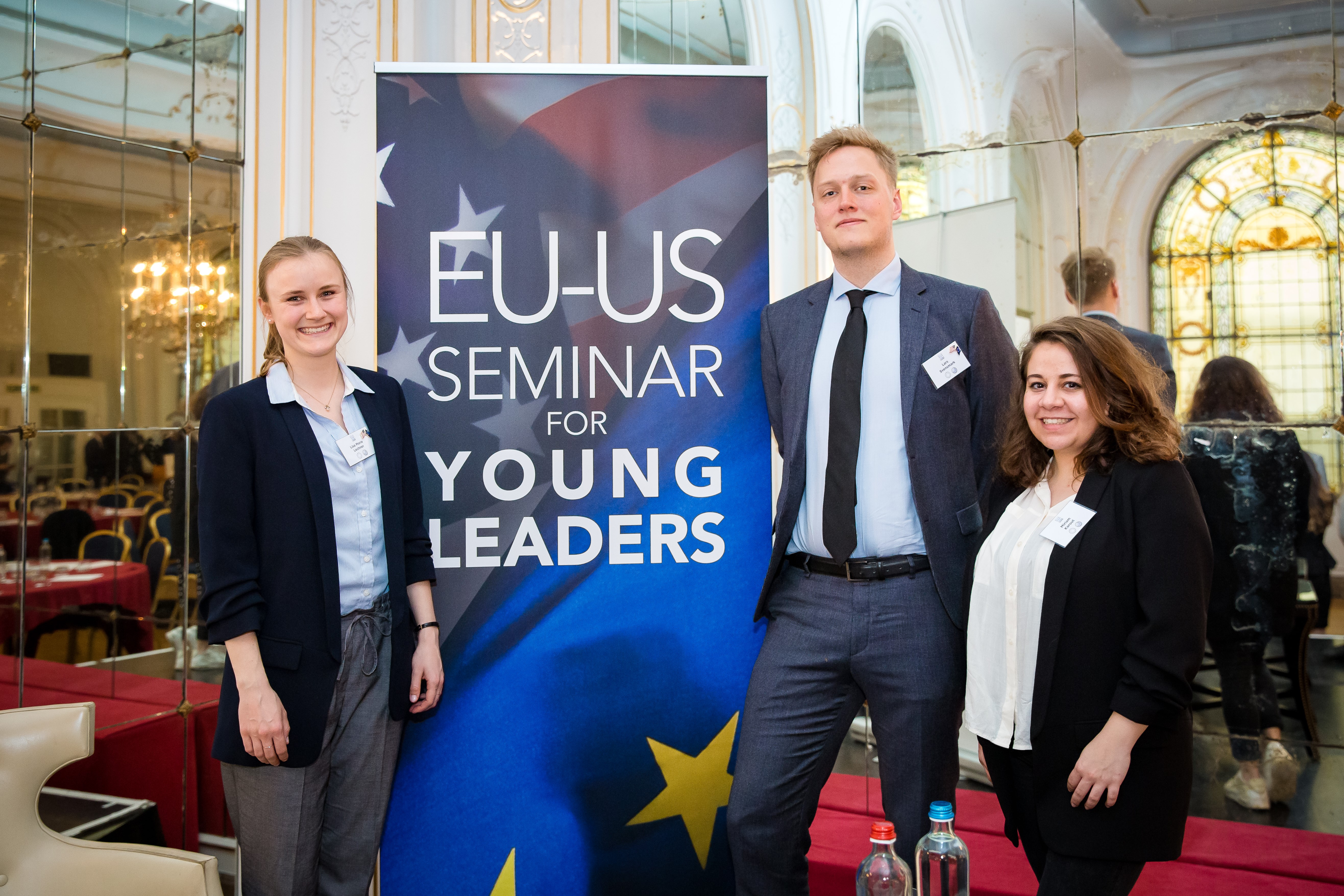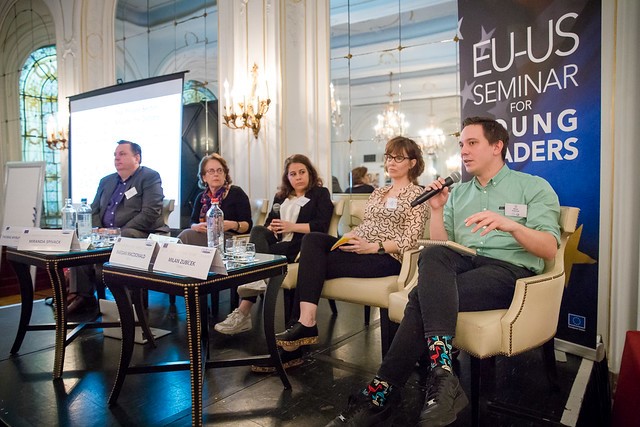Young scholars report on media literacy and misinformation
Three Mundus Journalism students recently attended a US-EU young scholars seminar. Here, they share some of their observations and key takeaway points from the three-day event.

Lisa Lechner: on the global need for better media literacy programmes
This year, three of us Mundusians – Miriam Karout, Lars Svensmark and me, Lisa Lechner - had the unique opportunity to be part of the EU-US Young Leaders Seminar in Brussels from 7 to 10 April. The three-day event focused on shared transatlantic challenges, disinformation, media literacy and the changing media landscape and was supported by the European Commission and the U.S. Department of State.
The first full seminar day on Monday was opened with a presentation on “Framing the Discussion” by Sophia Ignatidou, who is a current Academy Stavros Niarchos Foundation Fellow at Chatham House. She provided a general survey of EU and US advancements to combat the diverse issue of disinformation. Ignatidou also underlined the importance of a reform in media and political campaigning and the investment in digital media literacy programs.Also, us participants got to know about the “Action Plan against Disinformation” that the European Commission called for in December 2018. It is supposed to provide responses in the debate on disinformation – especially against the background of the upcoming European elections in May.
We need to invest in people’s understanding on how to make wise choices concerning their trust in facts, data and information.
Monday’s and Tuesday’s seminar days included panel discussions with experts from the U.S. Mission to the European Union and the European External Action Service amongst others. Together, the representatives debated the role of the private sector, the government and the civil society in the containment of disinformation. In general, they accentuated the importance of transparency by privately owned companies like Google and Facebook, e.g. by providing insights into their algorithms. Also, that the audience should be engaged to differentiate between various news sources. What remains as a challenge, however, is the global spread of disinformation and the creation of a worldwide approach.
Afterwards, the given information was discussed in smaller breakout sessions where we came up with several ideas on how our generation can deal with the international threat of false information and on how to make the young and elder audience aware of fact-checking processes. Accordingly, media literacy programs should be implemented and encouraged in schools, community centres and on public broadcasting channels as part of their obligation to inform. We should not miss out on the importance of the issue, as Lutz Güllner of the EEAS Strategic Communications Division highlighted, given that disinformation is not just about false information, but also about manipulation.
As the topic of disinformation and media literacy is not directly addressed in our master studies in Aarhus, I am sure that the seminar gave significant insights as a preparation on the media and politics track in Amsterdam that I am going to follow in the academic year of 2019 – 2020. As their still seems to be a lack of research within the field of disinformation and media literacy, it is an issue that should not be disregarded but picked up by us Mundus Journalism students in the future.
As a concluding remark from these two days we can sum up that disinformation and media literacy is a global problem that faces huge challenges in the future. We need to invest in people’s understanding on how to make wise choices concerning their trust in facts, data and information. Media literacy needs to be taught through the media itself. The burden of responsibility does not lie on one sector, but the fight against disinformation is a multifaceted task that needs to be involved in the government, the private sector and the civil society at the same time.
Lisa also blogged the event on our instagram account. Visit our instagram to see her live coverage of the seminar.
Miriam Karout: on how the private sector shapes debate about misinformation
I had the pleasure to participate in this year’s EU-US Young Leaders Seminar on media literacy and disinformation. As I had never heard of the seminar before, I was very excited and did not know what to expect upon my arrival in Brussels. Prior to the conference, the organisers had contacted me asking me to moderate one of the three panel discussions during the seminar as I had a background and experience in journalism and media. And of course, I agreed.

Miriam Karout (centre) in the midst of moderating her panel. Image: Fulbright Commission Belgium
Although I have been working as a journalist for a few years now, I never had the chance to actually moderate. It was a great opportunity for me to learn how to moderate on the spot. I was very nervous and tried to overcome my nervousness with humour – which apparently worked very well. The panel discussion was held on how the private sector shapes the debate media literacy and disinformation. It was heated at there were representatives from Google, Facebook and Mozilla as well as journalist Miranda Spivack, who enjoyed challenging the big tech giants. The opportunity to moderate such an interesting panel discussion was definitely my favourite aspect of the conference as I felt challenged and very lucky to be chosen.
I learned quite a few things on how different sectors influence the debate and where responsibility of disinformation should or might be taken.
The conference itself was overwhelming, in a sense that it was located in a classy hotel and that we were about 50 participants – 25 Erasmus Mundus scholars from all over Europe, as well as 25 Fulbright Scholars from the United States, who are currently researching, teaching or studying in Europe.
As I have been studying media communications and journalism for more than four years now, I felt like my prior knowledge about media literacy and disinformation was very strong. Nevertheless, I learned quite a few things on how different sectors influence the debate and where responsibility of disinformation should or might be taken.
Although I might have been familiar with most of the seminar’s content, the experience was very valuable to me in terms of networking. I have never had the chance to meet so many international young leaders with diverse backgrounds. Being an Erasmus Mundus Journalism student, I have a diverse network already, but it was mostly limited to people who work within the field of media and journalism. The EU-US Young Leaders Seminar offered me a once-in-a-life-time opportunity to meet people who work in very different fields all across Europe. I highly value the connections I made during the three days I spent in Brussels, and I know that some of these connections will be for a life time.
Lars Svensmark: on networking in Brussels
Being familiar with Brussels it's always a pleasure to be back, and no complaints can be made about the level of accommodation and venue we were at. Hotel Metropole is in many ways like the Belgian capital: Charming and extravagant but at the same time unmaintained and messy.
We were introduced to some high level speakers, both from the private sector, government and academia. However the panel discussions did not really offer many new perspectives for someone who have studied journalism for the past six years like me. The really interesting part was networking, both with the other participants at the seminar, but also ensuring some business cards from the speakers. Also I must highlight the hilarious speech held by the US ambassador to the EU, who claimed that public diplomacy was about other nations understanding the US better, no such attempts needed to be made the other way around.
It was great being back in the city where you can always wear a suit, never know when the cobblestones will be loose and where the next beer, waffle and chocolate store is never far away.